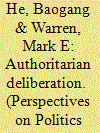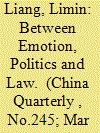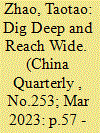| Srl | Item |
| 1 |
ID:
105246


|
|
|
|
|
| Publication |
2011.
|
| Summary/Abstract |
Authoritarian rule in China is now permeated by a wide variety of deliberative practices. These practices combine authoritarian concentrations of power with deliberative influence, producing the apparent anomaly of authoritarian deliberation. Although deliberation is usually associated with democracy, they are distinct phenomena. Democracy involves the inclusion of individuals in matters that affect them through distributions of empowerments such as votes and rights. Deliberation is a mode of communication involving persuasion-based influence. Combinations of non-inclusive power and deliberative influence-authoritarian deliberation-are readily identifiable in China, probably reflecting failures of command authoritarianism under the conditions of complexity and pluralism produced by market-oriented development. The concept of authoritarian deliberation frames two possible trajectories of political development in China: the increasing use of deliberative practices stabilizes and strengthens authoritarian rule, or deliberative practices serve as a leading edge of democratization.
|
|
|
|
|
|
|
|
|
|
|
|
|
|
|
|
| 2 |
ID:
154150


|
|
|
|
|
| Summary/Abstract |
Authoritarian rule in China increasingly involves a wide variety of deliberative practices. These practices combine authoritarian command with deliberative influence, producing the apparent anomaly of authoritarian deliberation. Although deliberation and democracy are usually found together, they are distinct phenomena. Democracy involves the inclusion of individuals in matters that affect them through distributions of empowerments like votes and rights. Deliberation is the kind of communication that involves persuasion-based influence. Combinations of command-based power and deliberative influence – like authoritarian deliberation – are now pervading Chinese politics, likely a consequence of the failures of command authoritarianism under the conditions of complexity and pluralism produced by market-oriented development. The concept of authoritarian deliberation frames two possible trajectories of political development in China. One possibility is that the increasing use of deliberative practices stabilizes and strengthens authoritarian rule. An alternative possibility is that deliberative practices serve as a leading edge of democratization.
|
|
|
|
|
|
|
|
|
|
|
|
|
|
|
|
| 3 |
ID:
178887


|
|
|
|
|
| Summary/Abstract |
Through studying a revenge murder triggered by a land dispute in China and the subsequent trial, this article explores “narrative transformation” in a social drama and proposes an event-based model for authoritarian deliberation. It argues that an obscure murder rose to prominence because it came to be narrated as a different kind of story. Initially viewed as “a normal killing,” it was transformed to represent a “contest” between a law-and-order frame, which emphasizes individual guilt, and a righteous-revenge frame, which symbolizes wider conflicts. The article also contends that in the absence of an institutionalized issue forum, contentious events present a model for authoritarian deliberation. That is to say, deliberation is often pegged to social dramas on the “judicial periphery,” thanks to a liminal phase inviting reflexivity, and exposes elite dissent that is otherwise veiled by an interest-driven alliance. In this case study, the media engaged with other institutions in contentious performances that affirmed hidden social fault-lines but also encouraged deliberation.
|
|
|
|
|
|
|
|
|
|
|
|
|
|
|
|
| 4 |
ID:
190405


|
|
|
|
|
| Summary/Abstract |
Since the early 2010s, a low-profile “dig deep and reach wide” campaign led by local Chinese Communist Party (CCP) committees has unprecedently institutionalized and embedded academic opinions into the regimes’ decision-making processes. This research aims to deepen the existing understanding of the intricate relationship between players in the CCP's decision-making process by analysing the Party's deliberation on scholarly opinions through an academic lens. It argues that the local Party committees’ incentives to incorporate academic opinions into their information channels are not only a reaction to the central CCP's increasing need to “reach wide” for high-quality and critical policy proposals but are also a move to seek political endorsement from the central authorities. This process has transformed government–academic relations in China from a patron-client model to one of increasing interdependence in which Chinese academia has become increasingly attuned to the thinking and needs of the CCP.
|
|
|
|
|
|
|
|
|
|
|
|
|
|
|
|